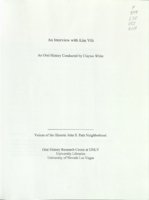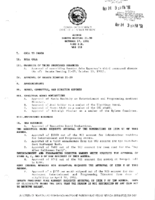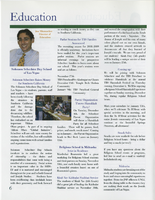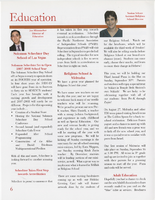Search the Special Collections and Archives Portal
Search Results

Transcript of interview with Todd Jones by Claytee White, January 7, 2010
Date
Archival Collection
Description
In 1991, Todd Jones arrived in Las Vegas to become a professor of philosophy at University of Nevada Las Vegas. He immediately liked the John S. Park neighborhood, where he had friends—members of a poetry group and other professors. He was attracted to the vintage esthetics and the feel of streets lined with large trees. It was a contrast with the explosion of homes being built in the city during the 1990s. Todd knew if ever bought a house, it would be there. In 2000 he did. He describes his impressions of the neighborhood's history as an old Mormon area. He also classifies the residents as being members of what her describes as three or four very distinct populations: "urban professionals, old Mormons, professors and lots of immigrants from Mexico. Todd talks about the neighborhood website that once existed and his impression of the political leanings of residents. At one point he worked as a Democrat precinct captain.
Text

Transcript of interview with Ray Keith by David Alexander, March 3, 1980
Date
Archival Collection
Description
On March 3, 1980, David Alexander interviewed community volunteer, Ray Keith (born October 1st, 1911 in Montgomery, Alabama) in her home in Las Vegas, Nevada about her life and memories of Southern Nevada. The two discuss how Keith first arrived in Las Vegas and the addresses that she has lived at. The interview concludes with Keith explaining how she helped to charter the “Home of the Good Shepherd” housing facilities with local Las Vegas women in the sixties.
Text

Transcript of interview with James Bonnell by Gerald L. Conner, February 22, 1977
Date
Archival Collection
Description
On February 22, 1977, James Bonnell interviewed Gerald L. Connor (born 1930 in Boston, Massachusetts) about his experiences in Nevada and his work in education. Connor first talks about his move to Nevada while he was a member of the United States Air Force. He then discusses his education, including that at the University of Nevada, Las Vegas, and also describes his church membership. Connor later talks about changes in the schools and school district, the growth of gambling and properties located in Downtown Las Vegas and the Las Vegas Strip, and the early atomic tests at the Nevada Test Site. He also describes in detail his political activity and involvement with the Democratic Party, including his work with candidates for the offices of Nevada Governor and United States Senator. Towards the end of the interview, Connor talks about events such as Helldorado, the growth of the city over time, and his thoughts on the future of Las Vegas.
Text

Transcript of interview with Kim Vilt by Claytee White, January 12, 2010
Date
Archival Collection
Description
Kim Vilt grew up in Woodland Hills, CA; lived an outdoor life in rural San Fernando Valley and was the oldest of four children. Graduated from CSUMB. Served with the Peace Corps in Bulgaria and met husband James J. Vilt there. Eventually Kim moved to Las Vegas and talks about changes to Las Vegas and to the John S. Park community. Kim Vilt has lived in the John S. Park Neighborhood for ten years and plans to stay there as long as she and her husband live in Las Vegas. Their house was built in 1946.
Text

Meeting minutes for Consolidated Student Senate University of Nevada, Las Vegas, October 17, 1991
Date
Archival Collection
Description
Text

Interview with Layton James O'Neill, July 23, 2004
Date
Archival Collection
Description
Text




